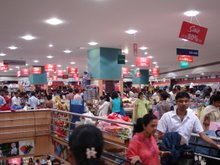In India, New Retail Chains Are Shaking Up The Traditional Markets
At a time when the average Indian consumer is crying hoarse against price rise and inflation, a cry that has woken up even the Kumbhkarnas in the government, it would be a positive thought to recall that the attempt to set up retail chain stores could help in controlling prices. With retail sale being encouraged by setting up of shops and counter under the umbrella of Reliance Fresh, now numbering 70 in different parts of the country out of which 20 are in the National Capital Region, the organizers and promoters of retail selling a optimistic, even positive, that the retail sales depots can help contain prices that at present are soaring. Very soon the nation wake up to a new set of economic possibilities with the presentation of fresh budget proposals by the Finance Minister P Chidambaram. It is being stated after making a calculated assessment that Budget 2007-08 may give a boost to linkages between rural Bharat and shining India. Organized retail, farmers and urban consumers stand to gain while a chain of intermediaries in the present system of distribution of rural produce to urban markets could lose out. Key policy has been initiated by the Centre outside the Budget. Recognizing warehouse receipts as negotiable instruments and setting up terminal markets as the cornerstones of the strategy, to transform farming at the margins of subsistence into an agri-business that is integrated into the rest of the economy. The Budget may complete the process. The aim is to permit the private sector to operate a variety of market activities: washing grading, cold storage, temperature controlled warehouses, ripening chambers, pack houses, quality testing facilities, real-time e-auctioning information, banking facilities, settlement of payment, sorting, multi-modal transport, advisory on inputs and collection of produce through collection centers at the base of terminal markets based on the hub and spoke format. To give an example of a successful example and experience in the private sector : it seems ITC’s International Business Division (ITC-IBD) , part of the $ 3.5 billion ITC Ltd, is no more dependent on local mandis for procurement of commodities. In an effort to bring down procurement costs and ensure quality standards, ITC-IBD is almost totally depending on its Web-enabled channel e-Choupal. News reports from different parts of the country in recent weeks have confirmed that new retail chains like Reliance and corporate agri-buyers like ITC are shaking up the traditional fruit and vegetable markets. By buying in bulk directly on the farmers’ doorstep, and booking future harvests as well, they are taking business from the traditional mandis. This has caused a sharp drop in supplies to the traditional wholesale markets and driving prices there.
Courtesy :EconomicTimes
For More Detail on Retail India Visit: http://www.retailindia.tv

No comments:
Post a Comment